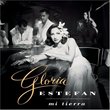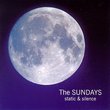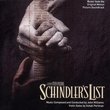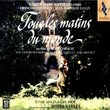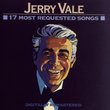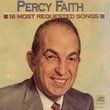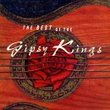| All Artists: Aaron Copland, Columbia Symphony Orchestra, New England Conservatory Chorus, Columbia Symphony Strings, New Philharmonia Orchestra, London Symphony Orchestra, Philharmonia Orchestra of London, Abba Bogin Title: The Copland Collection: Orchestral & Ballet Works, 1936-1948 Members Wishing: 1 Total Copies: 0 Label: Sony Release Date: 1/18/1991 Genres: Dance & Electronic, Special Interest, Soundtracks, Classical Styles: Marches, Opera & Classical Vocal, Ballets & Dances, Ballets, Forms & Genres, Concertos, Suites, Theatrical, Incidental & Program Music, Historical Periods, Modern, 20th, & 21st Century, Instruments, Keyboard, Reeds & Winds, Symphonies Number of Discs: 3 SwapaCD Credits: 3 UPC: 074644655926 |
Search - Aaron Copland, Columbia Symphony Orchestra, New England Conservatory Chorus :: The Copland Collection: Orchestral & Ballet Works, 1936-1948
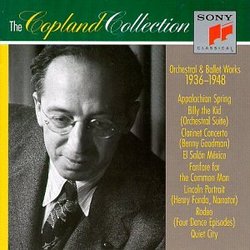 | Aaron Copland, Columbia Symphony Orchestra, New England Conservatory Chorus The Copland Collection: Orchestral & Ballet Works, 1936-1948 Genres: Dance & Electronic, Special Interest, Soundtracks, Classical
Aaron Copland made numerous recordings of his own music, including an extensive series for CBS during the 1960s and '70s, mostly with London orchestras. He was not an especially proficient conductor--consequently, the perf... more » |
Larger Image |
CD DetailsSynopsis
Amazon.com Aaron Copland made numerous recordings of his own music, including an extensive series for CBS during the 1960s and '70s, mostly with London orchestras. He was not an especially proficient conductor--consequently, the performances he conducted often lacked pace and rhythmic punch. His last recordings of his most popular scores have been reissued by Sony on an exceptionally well-remastered 3-CD set. These accounts do a good job of conveying the overall shape of the pieces, and they deliver telling characterizations of many episodes. Details emerge that are lost in some other accounts, and there is an appealing gentleness and sweetness to the approach. But the readings do not have as much grip as those of Bernstein and Slatkin, among others, and in spite of the authority they automatically possess, they are not necessarily preferable. --Ted Libbey Similarly Requested CDs
|
CD ReviewsAaron Copland: Populist and Conductor ADB | Colorado Springs, CO United States | 03/28/2005 (5 out of 5 stars) "If you want a prime collection of Copland's more accessible works, this is it. Yes, it's true that Bernstein's recordings of individual pieces are often bolder and livelier; but this set offers the composer's own authoritative view of his work, and for that reason alone it is priceless. In addition, it includes virtually all the orchestral pieces he composed during his "populist phase," from El Salon Mexico (1936) to the Clarinet Concerto (1948). You won't find some of these lesser-known gems, such as An Outdoor Overture (1938) or Letter from Home (1944, written--like Rhapsody in Blue--for Paul Whiteman), on typical single-disc Copland compilations. I'd even go so far as to claim this as one of the four indispensable compilations of American instrumental music from the first half of the twentieth century (the others on my list--in case anyone cares--are Joshua Rifkin playing Scott Joplin, Oscar Levant playing Gershwin, and the Blanton-Webster band recordings of Duke Ellington). What amazing riches flowed from Copland's pen during the period covered by these three discs! Billy the Kid (1939), Quiet City (1940), Our Town (1940), Fanfare for the Common Man (1942), Rodeo (1942), Lincoln Portrait (1942), Appalachian Spring (1944), and the Third Symphony (1946)--all are here. Some of this music is so familiar, so deeply ingrained in America's cultural consciousness, that we might be tempted to take it for granted. But imagine how much poorer the American concert repertoire would be without it. It's almost impossible, at this point, to conceive of a time when this wonderful music--which is to America roughly what Mussorgsky's music is to Russia, Grieg's to Norway, and Falla's to Spain--didn't exist. It was during the dozen years covered by this collection that Copland pulled away from the pack of his talented contemporaries (Hanson, Thomson, Harris, etc.) and, in a way, but with greater technical sophistication, filled the void left by the tragically early death of Gershwin, whose heyday, 1924-1935, immediately preceded the composition of the works on this collection. The ballet music is all presented here in the familiar orchestral suites Copland arranged. Most of the selections are played by the London Symphony Orchestra, although the New Philharmonia and the just-plain Philharmonia get cracks at a few key works. The last-named orchestra, for instance, takes on the biggest piece on the program, Copland's Third, the closest thing American music has to a Beethoven's Ninth (although the work's sublime rhetoric has never completely convinced me--it's neither my personal favorite by Copland nor my favorite American symphony . . . but it sure has its moments). In addition to the fine orchestral playing, another treat is that Henry Fonda narrates the Lincoln Portrait--an almost inevitable pick, given the virtually mythic way his acting style embodied the American spirit and the fact that he had portrayed the sixteenth president in John Ford's classic film Young Mr. Lincoln (1939). The set concludes with what, over the years, has become my favorite work by Copland, the Concerto for Clarinet, Strings, Harp, & Piano, written for and performed here by surely the last century's greatest clarinetist, Benny Goodman. This work effects a concise synthesis between Copland's mature style and his earlier jazz stylings from the 1920s; in addition, the searing eloquence of the opening slow movement seems to me the most profound lyrical writing Copland ever achieved. Stoltzman's recording, ironically enough, swings harder than the king of swing's, but this collaboration between the composer and the man who commissioned it is for the ages. The only major "populist" scores written after the period this collection covers are the film scores to The Red Pony (1948) and The Heiress (1949). Both can be acquired on an essential Leonard Slatkin CD for RCA. And since this collection doesn't include chamber music, the great Violin Sonata (1943), a kind of more intimate counterpart to Appalachian Spring, will have to be sought elsewhere. (One good option is Gil Shaham/Andre Previn on DG.) A serious Copland collector will also want to grab the other two volumes of the Copland Collection itself. The early set features important works such as the Organ Symphony (1924), Music for the Theater (1925), and the Short Symphony (1932)--but both of the other collections also include long, thorny pieces like the early Symphonic Ode and the late Connotations that can be rather difficult for the average enthusiast to enjoy. Most of the essential, universal Copland is to be found on this second installment of the Copland Collection, and I would definitely recommend it as the place to start exploring Copland's magnificent contribution to American music. It has been a wonderful and treasured companion of mine for many years, and it also serves to conjure up a timely and inspiring vision of open prairies, nocturnal cityscapes, and the populist, humane values that America should, ideally, epitomize. " A great way to get your dose of Copland.... Cory | Virginia | 06/30/2000 (4 out of 5 stars) "The 2nd of this three CD collection is wonderful. My favorite though is the third one. Doesn't mean this isn't good. This Sony Copland Collection set is worth the money for. Copland is sooo much more then Appalachian Spring, Fanfare for the Common Man, Rodeo, etc... But you get a lot of typical Copland on these CDs. Songs we all know and love. But there are some unfamiliar good ones too. Concerto for Clarinet took me by storm. So did Letters from Home. Good quality, good booklet, good recording, good playing (how Copland got the London Symphony to play something right I will never know), good everything. It's not perfect because it doesn't compete with THE best Copland like the third CD set of this collection, or the The Tendeer Land. Oh, these three CD sets don't cover all Copland, but it does for the most part. It doesn't have many chamber works, two choral works, and his two operas. You can cover some of those with the full version of Tender Land and of Second Hurricane (which also comes with the choral work, In the Beginning). But this is a good series. I highly recommend it!" Tribute to Lincoln C. Anderson | Covina, CA United States | 10/27/2001 (5 out of 5 stars) "I purchased this set of Copeland CD's because I wanted the Tribute to Lincoln narrated by Henry Fonda. This is a masterful recording especially for Americans in this time. The Tribute sends chills down my spine whenever I her it. My greatest joy however, was how much I have enjoyed all of the CD's in the set. I tend to be much more of a classical listener. I have heard Copeland but not in any organized fashion. This set has brought a new and delightful experience to my listening options."
|

 Track Listings (14) - Disc #1
Track Listings (14) - Disc #1